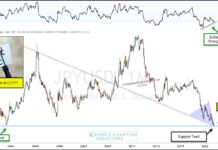 By Greg Naylor August was an uneventful month for economic data, although worries about Syria probably crept into market behavior somewhat. As well, the financial markets were preparing for the Fed’s September meeting (the result of which we now know). By the numbers:
By Greg Naylor August was an uneventful month for economic data, although worries about Syria probably crept into market behavior somewhat. As well, the financial markets were preparing for the Fed’s September meeting (the result of which we now know). By the numbers:
Stocks & Bonds
After a strong July, most assets declined a bit in August. Inflation remains quite muted, leaving the Fed plenty of room to maneuver.
| S&P 500 Total Return | MSCI EAFE | BarclaysAggregateBond | Unadjusted CPI | |
| August | -2.90% | -0.23% | -0.51% | 0.04% |
| July | 5.09% | 5.23% | 0.14% | 0.24% |
| YTD 2013 | 16.15% | 7.26% | -2.81% | 1.46% |
Commodities & Currencies
NYMEX crude gained 2.32 % in August, up to $107.65 per barrel. Gold rose 4.54% to a close of $1,396.10 per ounce. For the most part commodities saw modest gains in August, after seeing declining prices for most of the first half of the year. The dollar index declined in August by 0.79%.
Economy
On the economic data front… The Labor Department reported that the unemployment rate ticked down slightly, from 7.4% in July to 7.3% in August, although the economy added only 169,000 jobs. The Institute for Supply Management had surprisingly good news, reporting that the manufacturing PMI in July rose to 55.4, a strong gain from June’s 50.9, indicating a growing expansion in the manufacturing sector. Previous months had indicated slow growth or even slight contraction.
The National Association of Realtors (NAR) reported that the annual rate of existing-home sales in July increased by 17.2% from July 2012. National median prices rose from the prior year by 13.7% to $213,500. Foreclosures and short-sales, as a percentage of overall sales, remained the same month-over-month at 15%, much lower than they have been for the past few years.
Summary
As for economic data, the good news is that unemployment is down. The bad news is that employment is also down. “Since hitting a 26-year high of 10 percent in October 2009, the unemployment rate has fallen 2.7 percentage points, according to the Labor Department in Washington. A big portion of that decline — 1.8 points — was because of a drop in labor-force participation to 63.2 percent.” Normally, a declining unemployment rate means more income for the population. However, with only a marginal employment recovery (primarily in retail and food services), and historic numbers of Americans taking retirement early at age 62, I do not see any reason to believe that the shrinking unemployment rate will translate into economic growth as it has in the past (although of course it is still better to have weak job growth than no job growth at all).
The consumer continues to struggle, and of course businesses consequently are reluctant to invest. The 3rd pillar of the economy, government, is also a bit of a drag on the economy through the sequester and this year’s higher taxes. I continue to worry about deflation and its impact.
This material was prepared by Greg Naylor, and does not necessarily represent the views of Woodbury Financial or its affiliates. This information should not be construed as investment, tax or legal advice and may not be relied upon for the purpose of avoiding any Federal tax liability. This is not a solicitation or recommendation to purchase or sell any investment or insurance product or service, and should not be relied upon as such. The S&P500, MSCI EAFE and Barclays Aggregate Bond Index are indexes. It is not possible to invest directly in an index.
Investing involves risks and investors may incur a profit or a loss. Past performance is not an indication of future results. There is no guarantee that a diversified portfolio will outperform a non-diversified portfolio in any given market environment. No investment strategy can guarantee a profit or protect against loss in periods of declining values.
Data Sources:
- www.standardandpoors.com – S&P 500 information
- www.msci.com – MSCI EAFE information
- www.barcap.com – Barclays Aggregate Bond information
- www.bloomberg.com – U.S. Dollar & commodities performance
- www.realtor.org – Housing market data
- www.bea.gov – GDP numbers
- www.bls.gov – CPI and unemployment numbers
- www.commerce.gov – Consumer spending data
- www.napm.org – PMI numbers
- www.bigcharts.com – NYMEX crude prices, gold and other commodities
- https://data.bls.gov/timeseries/LNS11300000 – Labor participation data
- https://www.bea.gov/newsreleases/national/pi/pinewsrelease.htm – PCE reference numbers
- https://www.cnbc.com/id/100877586 – Bernanke comments
- https://www.bloomberg.com/news/2013-09-09/unemployment-falling-for-wrong-reason-creates-fed-predicament.html – Unemployment rate
About Greg Naylor: Greg is a partner and co-founder of Fiat Wealth Management, an independent financial advisory firm in Long Lake, Minnesota. He has been investing for over 7 years and enjoys sports, reading, singing, and spending time with family. Greg is a 2004 graduate of the University of Minnesota and lives in South Minneapolis with his wife Kat. Click here for more articles by Greg.
Twitter: @seeitmarket Facebook: See It Market
Any opinions expressed herein are solely those of the author and do not in any way represent the views or opinions of any other person or entity.








